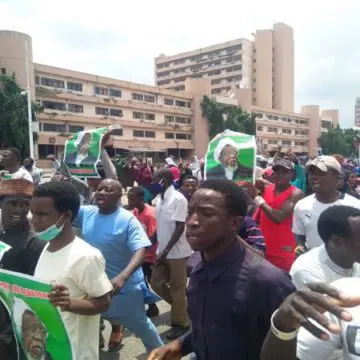The recent violent clash between the Nigerian Police and the Islamic Movement of Nigeria (IMN), also known as the Shi’ite group, during the Arbaeen procession in Abuja on August 25, 2024, has led to a tragic loss of life and escalating tensions. Both parties are blaming each other for the incident, which resulted in the deaths of two police officers, among others.
Alleged Attack on Officers: The Nigeria Police Force, through its spokesperson, MuyiwaAdejobi, claimed that the IMN members launched an unprovoked attack on police officers during the procession. According to the police, the attackers were armed with machetes, improvised explosive devices, and knives, leading to the immediate death of two officers and serious injuries to three others who are currently hospitalized.
Damage to Property: The police also reported that three of their patrol vehicles were set on fire by the IMN members.
Arrests and Ongoing Investigation: In response to the attack, the police arrested 97 suspects and recovered weapons used in the violence. The Inspector-General of Police, Kayode Egbetokun, has vowed to bring all those involved in the attack to justice, emphasizing the importance of maintaining law and order.
Allegations Against the Police: The IMN, represented by Sheikh Sidi Mainasara, strongly refuted the police’s version of events. The group accused the police of being the aggressors, claiming that officers opened fire on peaceful participants in the Arbaeen procession, which is an annual religious observance commemorating the martyrdom of Imam Hussein.
Condemnation of Police Actions: The IMN condemned the police’s statement as false and misleading, arguing that it was an attempt to scapegoat the movement and justify further violence against its members. The group also alleged that the police’s actions were part of a broader pattern of rights abuses against them.
Historical Tensions: The relationship between the Nigerian government and the IMN has been fraught with tension for years, often resulting in violent confrontations. The government’s crackdown on the IMN, particularly after the 2015 Zaria massacre, has led to repeated clashes, with the IMN accusing the government of persecution and rights violations.
Potential for Escalation: The conflicting narratives and the loss of life raise concerns about the potential for further violence. The IMN has a large following, particularly in the northern part of Nigeria, and further crackdowns could lead to more unrest.
Legal and Human Rights Issues: The situation also highlights ongoing issues related to human rights in Nigeria, particularly the rights of religious minorities and the conduct of law enforcement agencies.
The situation remains tense, and the outcome of the police investigation, as well as any legal actions taken against the arrested IMN members, will likely influence the next phase of this conflict. Both the government and IMN are expected to engage in a war of narratives, each trying to win public sympathy and international attention. The international community and human rights organizations may also weigh in, especially if there are further reports of rights abuses or violent confrontations.









